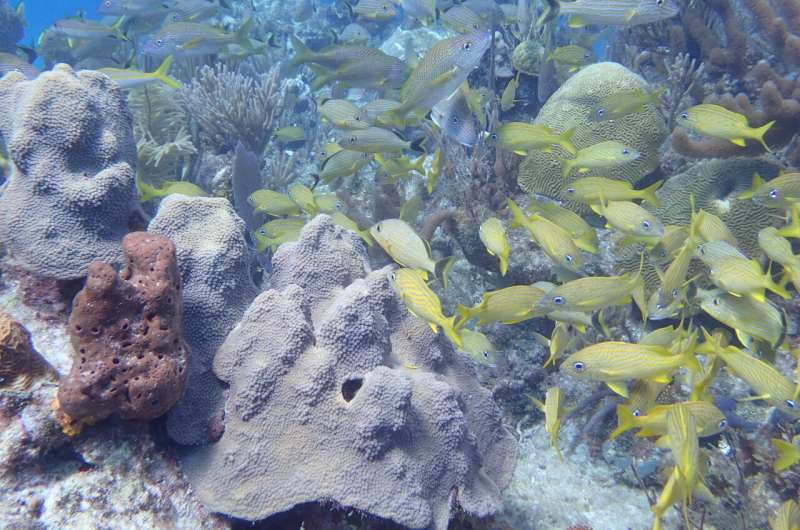This article has been reviewed according to Science X's editorial process and policies. Editors have highlighted the following attributes while ensuring the content's credibility:
fact-checked
peer-reviewed publication
trusted source
proofread
Scientists 'read' the messages in chemical clues left by coral reef inhabitants

What species live in this coral reef, and are they healthy? Chemical clues emitted by marine organisms might hold that information. But in underwater environments, invisible compounds create a complex "soup" that is hard for scientists to decipher.
Now, researchers have demonstrated a way to extract and identify these indicator compounds in seawater. They found metabolites previously undetected on reefs, including three that may represent different reef organisms. The findings are published in the Journal of Proteome Research.
Plants and animals living in coral reefs release various substances, from complex macromolecules to individual amino acids, into the surrounding water. To determine which ones could identify the ecosystems' inhabitants and be used to measure a coral reef's health, scientists need to prepare water samples for analysis by concentrating the compounds and separating them from the salty broth.
They primarily concentrate and collect these dissolved compounds from seawater on sticky membranes. However, this method misses many important nitrogen-, oxygen- and sulfur-containing compounds produced by marine organisms. These metabolites don't attach well to the membrane materials and are present at extremely low levels in seawater.
To overcome these challenges, Brianna Garcia, Amy Apprill, Elizabeth Kujawinski and colleagues at Woods Hole Oceanographic Institution tested a technique that modified the dissolved metabolites before they were extracted from seawater into a form that's compatible with membrane materials, allowing them to be concentrated and analyzed.
First, the researchers collected and filtered water samples from five coral reefs around the U.S. Virgin Islands. They then used a series of reactions to attach a benzoyl functional group to dissolved amine- and alcohol-containing metabolites. Next, the team extracted the modified metabolites from the samples and assessed their composition and concentrations with liquid chromatography-mass spectrometry.
By applying this new technique, the researchers identified 23 metabolites that hadn't been identified near coral reefs by previous studies, including amino acids, amines, pyrimidine nucleosides and organosulfonic acids, which are involved in photosynthesis and organismal growth. When the researchers analyzed their data, they found that:
- The presence of diseased coral, macroalgae and crustose coralline algae had the greatest influence on the metabolite compositions.
- Some compounds, such as the organosulfonic acid called DHPS, were consistently at high levels in all locations, which suggests the presence of coral and associated organisms.
- Three metabolites (homoserine betaine, tryptophan and γ-aminobutryic acid) had significantly different levels among the five reefs, and the researchers attribute those differences to variations in marine environments and organisms.
The researchers say this study successfully demonstrates how to collect previously overlooked, ecologically relevant compounds in coral reef ecosystems that could be used to monitor them for effects of climate change, natural disturbances and disease activity.
More information: Brianna M. Garcia et al, Benzoyl Chloride Derivatization Advances the Quantification of Dissolved Polar Metabolites on Coral Reefs, Journal of Proteome Research (2024). DOI: 10.1021/acs.jproteome.4c00049
Journal information: Journal of Proteome Research
Provided by American Chemical Society



















